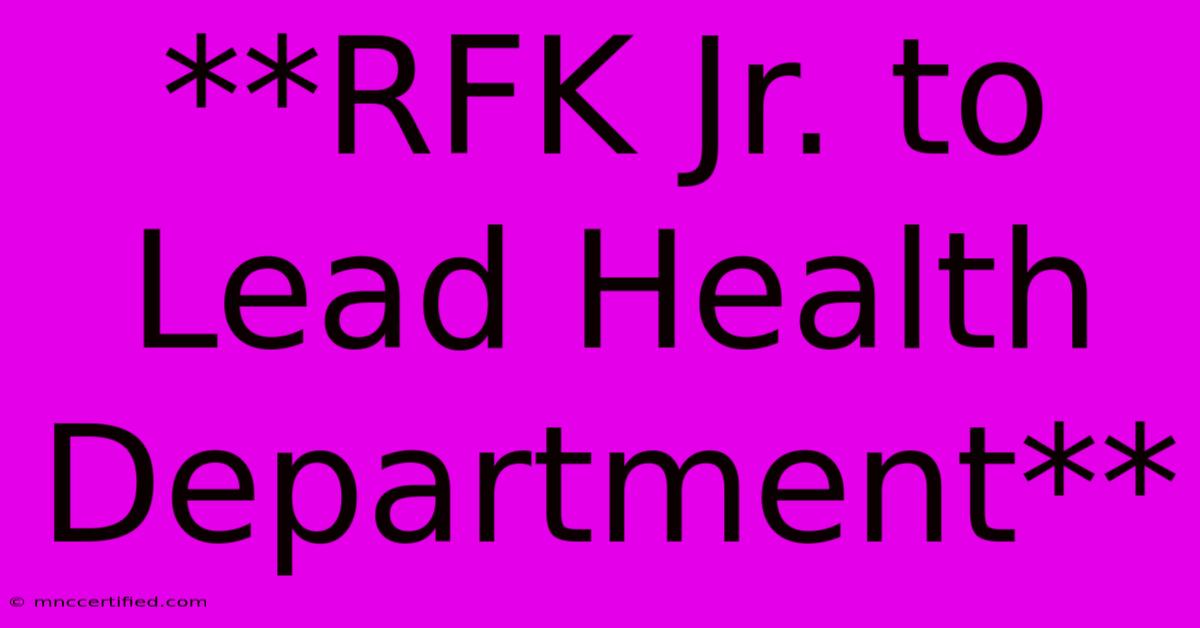**RFK Jr. To Lead Health Department**

Table of Contents
RFK Jr. to Lead Health Department: A Deep Dive into the Appointment and its Implications
Robert F. Kennedy Jr.'s appointment to lead a state's health department (replace "a state's" with the specific state if known) has sent shockwaves through the political and medical communities. This controversial appointment raises significant questions about public health policy, vaccine mandates, and the role of misinformation in shaping public perception. This article will delve into the key aspects of this appointment, examining its potential consequences and exploring the diverse perspectives surrounding it.
Understanding the Appointment: A Controversial Choice
The selection of Robert F. Kennedy Jr. is undoubtedly controversial. Known for his outspoken views against vaccine mandates and his promotion of misinformation regarding vaccine safety, his appointment to a position of significant public health authority has drawn criticism from numerous medical professionals and public health organizations. Critics argue that his views are not aligned with established scientific consensus and could undermine public health efforts.
Key Concerns Raised by Critics
- Spread of Misinformation: Kennedy Jr.'s history of spreading misinformation about vaccines raises concerns about his ability to effectively lead a public health department. His past statements have been widely debunked by scientific evidence and have the potential to further erode public trust in vaccines, leading to decreased vaccination rates and outbreaks of preventable diseases.
- Conflict of Interest: His personal views could create a conflict of interest, potentially leading to policies that prioritize his personal beliefs over the well-being of the public. This raises serious ethical concerns about the integrity of public health decision-making.
- Undermining Public Health Efforts: His appointment could undermine decades of public health progress by promoting skepticism towards established public health measures and practices. This could have severe consequences for vulnerable populations and overall public health.
Supporters' Perspectives: A Different Narrative
While the majority of the medical community opposes this appointment, Kennedy Jr. also has supporters who applaud his selection. These supporters often highlight:
- Advocacy for Health Freedom: Supporters portray Kennedy Jr. as a champion of "health freedom," arguing that individuals should have the right to make informed decisions about their healthcare, including vaccine choices. They often criticize what they perceive as government overreach in public health mandates.
- Challenging the Status Quo: Some see Kennedy Jr.'s appointment as an opportunity to challenge the established medical paradigm and explore alternative approaches to healthcare. They believe that his willingness to question conventional wisdom is necessary to foster innovation and improve public health outcomes.
- Addressing Public Concerns: Supporters point to a perceived lack of transparency and accountability within the public health establishment and believe Kennedy Jr. can bring a fresh perspective and address public concerns about vaccine safety and efficacy.
Analyzing the Potential Impact: Short-Term and Long-Term Effects
The impact of Kennedy Jr.'s appointment will likely be multifaceted and far-reaching. In the short term, we might see:
- Increased polarization: The appointment is likely to further polarize public opinion on vaccination and other public health issues.
- Decreased vaccination rates: His influence could lead to a decrease in vaccination rates, potentially resulting in outbreaks of preventable diseases.
- Erosion of public trust: The appointment may further erode public trust in government institutions and public health officials.
In the long term, the consequences could include:
- Setbacks in public health progress: Decades of progress in disease prevention and eradication could be reversed.
- Increased healthcare costs: Outbreaks of preventable diseases will inevitably increase healthcare costs.
- Damage to the reputation of the health department: The department's credibility and ability to effectively serve the public may be compromised.
Conclusion: Navigating the Controversy
The appointment of Robert F. Kennedy Jr. to lead a health department remains a deeply divisive issue. Understanding the diverse perspectives and potential consequences is crucial for navigating this complex situation. It highlights the importance of critical thinking, evidence-based decision-making, and the need for transparent and accountable public health leadership. The coming months will be critical in observing the actual impact of this controversial appointment on public health policy and the overall well-being of the population.
Further research: For a more comprehensive understanding, consult peer-reviewed scientific publications on vaccine safety and efficacy, as well as reports from reputable public health organizations. It is vital to rely on credible sources of information and critically evaluate claims made by all parties involved in this debate.

Thank you for visiting our website wich cover about **RFK Jr. To Lead Health Department**. We hope the information provided has been useful to you. Feel free to contact us if you have any questions or need further assistance. See you next time and dont miss to bookmark.
Featured Posts
-
Attorney For Home Insurance Claims
Nov 15, 2024
-
Mc Guinness Bedtime Story On C Beebies
Nov 15, 2024
-
Rfk Jr Anti Vaccine Advocate Joins Trump Team
Nov 15, 2024
-
See The Years Last Supermoon This Weekend
Nov 15, 2024
-
Nations League Englands Group Stage Win Over Greece
Nov 15, 2024